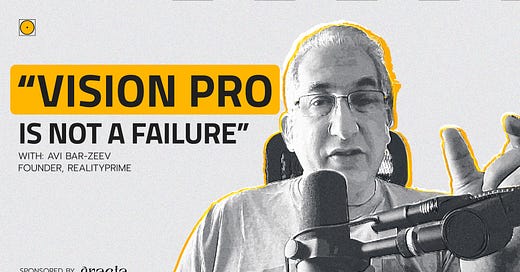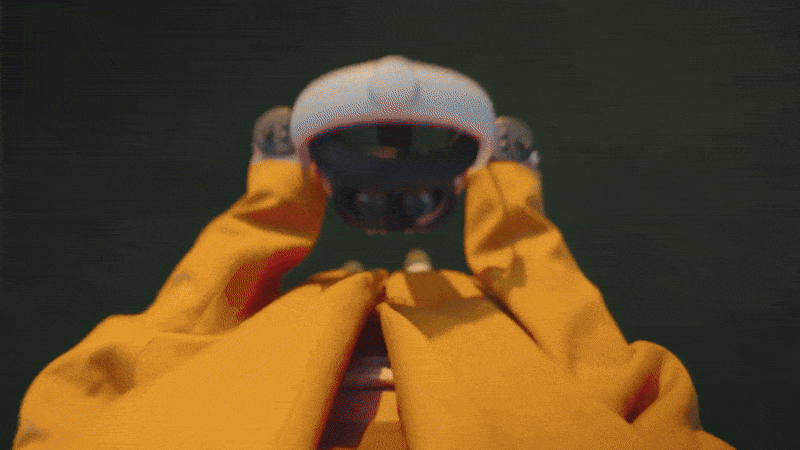Avi Bar-Zeev helped invent the Microsoft HoloLens, define Amazon Echo Frames, and led Apple Vision Pro’s experience prototyping team from 2016 to 2019. In this interview, we dive into the current state of XR adoption, the pitfalls of big tech, and why ad-based business models are dying.
Before getting into the interview, I wanted to quickly introduce you to today’s sponsor Gracia AI. Gracia AI is the only app that allows you to experience Gaussian Splatting volumetric videos on a standalone headset, either in VR or MR.
It is a truly impressive experience and I recommend you to try it out right now on your Quest or PC-powered headset.
Interview with Avi Bar-Zeev
You worked for years at Apple on the Vision Pro. How do you feel about the final product and the way people have reacted to it?
Avi Bar-Zeev: I’m a little frustrated with some of the writing about it. People have taken rumors of rumors and jumped to the conclusion that it was a failure, and I don’t think that’s true. There are things I would change, sure, but overall, the Vision Pro hit the marks it was meant to hit. It delivers the best immersive 3D movie experience I’ve ever seen, it’s a fantastic virtual monitor, and co-presence is something that will take time for people to appreciate. If we’d had this before COVID, it would have changed the way we experienced the pandemic.
What are the biggest mistakes tech giants make when trying to predict user adoption?
Avi Bar-Zeev: The biggest misconception every company makes is thinking we’re closer than we really are. Every product I’ve worked on was expected to ship faster and cheaper than it actually did. You can build a cheap headset, but can you make one that’s light, doesn’t cause nausea, has high enough resolution to read text, and feels natural to wear all day? That’s incredibly hard. Big companies do demos of individual features, but pulling them all together into a single product that works well is where things fall apart. It always takes longer than people want to admit.
How should companies involve users in the development process?
Avi Bar-Zeev: Users in focus groups don’t always give you the best information because they don’t know what they don’t know. The most important thing is diversity, and I mean real diversity of experience. If a team is made up of only people who never get motion sick, they’ll assume their product is fine, when 75% of their actual users will feel nauseated. If they don’t consider different head shapes, hair types, or accessibility needs, they’ll exclude huge parts of the market without even realizing it. A diverse team helps catch these blind spots before launch.
The Quest 3 is the cheapest high-quality headset ever. Are we finally there?
Avi Bar-Zeev: It’s an impressive device, but I have philosophical issues with it. Meta can afford to sell it cheap because it’s subsidized by ad revenue. Even if they’re not running ads on the headset yet, the money keeping that division alive comes from ad dollars. I don’t think we had to rush into making the cheapest possible headset. The market isn’t ready for it. That’s why Zuckerberg’s push for the metaverse didn’t land—people don’t see XR as a way to feel socially connected yet. That will come later, but we’re not there yet.
Everyone talks about a “killer app” for XR. What’s your take?
Avi Bar-Zeev: We don’t need one killer app. The killer app for smartphones wasn’t an app—it was the App Store itself. Having millions of apps competing for different needs was what made smartphones take off. XR needs that too. But for that to happen, we need millions of devices in people’s hands. No developer wants to build for a platform with only 100,000 users. It’s a chicken-and-egg problem: we need great content, but developers won’t make it until the market is big enough.
You’ve mentioned co-presence a lot. Why is it so important?
Avi Bar-Zeev: Video calls are terrible at making you feel like you’re with someone. When you talk on a phone, the voice is inside your head—there’s no spatial separation. Your brain doesn’t assign a real-world location to it, so it doesn’t feel like the person is there. Co-presence fixes that. With spatial audio and realistic facial expressions, it feels like you’re actually together. This isn’t about watching a PowerPoint in VR—it’s about recreating the feeling of presence.
Charlie Fink recently said AI might replace AR glasses entirely. What do you think?
Avi Bar-Zeev: AI-powered audio interfaces will be huge, but they won’t replace everything. AI can tell you information instead of showing it, but sometimes visuals are necessary. Also, spatial audio isn’t good enough yet. If AI-driven audio is the future, we need to get that experience right first before it can replace screens.
You’ve said ad-based business models are doomed. Why?
Avi Bar-Zeev: Advertising is wasteful. Even advertisers admit they don’t know if their ads work. People hate ads, and AI is going to kill them completely. In the future, when you ask your AI, “What’s the best pair of headphones?”, it will just tell you, you won’t need ads at all. The only question is: who controls the AI? If it’s working for you, that’s great. But if it’s secretly pushing products for an ad-driven company? That’s a huge problem.
What can we learn from past mistakes in tech?
Avi Bar-Zeev: The internet was built on openness, but we didn’t think about privacy or how data could be exploited. Now companies scrape people’s content for AI training without paying them. That’s a massive ethical failure. Instead of making the same mistakes, we should build a system that rewards creators fairly. AI doesn’t have to be exploitative—it’s just that the business models behind it often are.
What excites you most about the next few years?
Avi Bar-Zeev: AI changes everything about how we design products. Before, if you wanted to test a product, you had to build it, launch it, and hope 100,000 users validated it. Now, with AI, I can simulate that user base before building anything. That means we can test ideas faster, fix problems before launch, and skip years of slow iteration. That’s going to transform innovation.
Final thoughts?
Avi Bar-Zeev: People think they have to chase every new technology—but they don’t. It’s okay to go slow, to wait and see what works, and to use technology intentionally. Not everything needs to be cutting-edge. The real winners in tech aren’t the ones who jump on every trend—they’re the ones who focus on what truly improves people’s lives.
That’s it for today, and don’t forget to subscribe to the newsletter if you find this interesting
See you next week







Love reading someone who is technologically optimistic but also critical of business models that work against our societal values